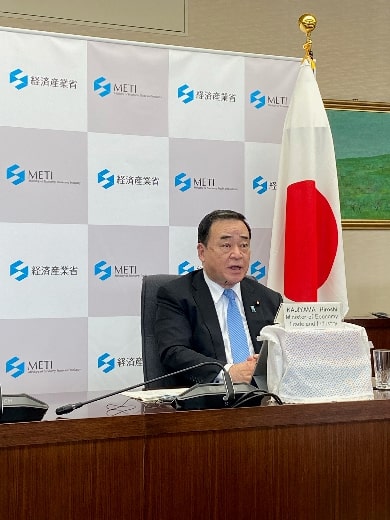June 22, 2021
Efforts begin toward development of carbon capture, utilization and storage (CCUS) in Asia.
On June 22, Mr. Hiroshi Kajiyama, Minister of Economy, Trade and Industry of Japan, attended the 1st Asia CCUS Network Forum and announced the launch of the ”Asia CCUS Network”, which is an international industry-academia-government platform aiming at knowledge sharing and improvement of the business environment for utilization of carbon capture, utilization, and storage (CCUS) throughout the Asia region. 13 countries (all ASEAN member states, Australia, the United States of America and Japan) and more than 100 companies, research institutions, and international organizations have so far expressed their intention to participate in the network.
Outline of the ”Asia CCUS Network”
According to the International Energy Agency (IEA), CCUS technologies will play in putting the world on a path to net-zero emissions, contributing more than 10% of cumulative emissions reductions globally to 2050. According to the Global CCS Institute, each of the ASEAN countries has a storage capacity of over 10 billion tons. Furthermore, “Carbon Capture, Utilisation and Storage: The Opportunity in Southeast Asia”, a special report newly released by the IEA on June 21, states that CCUS will play a significant role in the Southeast Asian region, where demand for fossil fuels will remain high. CO2 capture in Southeast Asia will have to reach at least 35 Mt CO2 in 2030, and will need to exceed 200 million tons by 2050. In order to achieve this level of CCUS deployment, it is estimated that by 2030, investment of more than US$1.0 billion per year is required.
In this context, the Ministry of Economy, Trade and Industry (METI) and the Economic Research Institute for ASEAN and East Asia (ERIA) are holding “The 1st Asia CCUS Network Forum” on June 22nd and 23rd, 2021. On June 22nd, Minister Kajiyama announced the launch of the “Asia CCUS Network” as an international industry-academia-government platform aiming at knowledge sharing and improvement of the business environment for utilization of carbon capture, utilization, and storage (CCUS) throughout the Asian region at the opening session of the forum. It was also announced that 13 countries (all ASEAN member states, Australia, the United States of America and Japan) and more than 100 international organizations, companies, financial and research institutions that share the vision of CCUS development throughout the Asian region have expressed their intention to participate in its activities.
In addition, Minister Kajiyama explained the following activities as showcases of Japan’s contribution to the development of CCUS in the Asian region;
- Developing a vision for inter-industry collaboration at the Tomakomai CCUS and Carbon Recycling Demonstration Center, where oil and gas fields, power plants, manufacturing industry, biomass and CCS demonstration centers are located
- The development of innovative capture technologies and the demonstration of long-distance CO2 transportation by ship, for which the adoption of the operator was announced today.
- Toward the realization of CCUS demonstration utilizing the Joint Crediting Mechanism (JCM) between Indonesia and Japan, joint studies by Japanese and Indonesian companies will be launched on the basis of memorandum of cooperation and joint study agreement.
- International collaboration with the United States and Australia to demonstrate the application of Japanese monitoring and injection technologies
- Providing practical guidance for geological CO2 storage through the Asia CCUS Network (the first issue is scheduled to be published in August 2021)
Minister Kajiyama also announced that further explanations will be provided by each related party in the “Japan CCUS Showcase” session at the Forum on June 23rd.
Ministers from Brunei, Cambodia, Indonesia, Laos, Philippines, Singapore, Thailand, Australia and the United States of America attended the ministerial session and expressed their congratulations on the launch of the Asia CCUS Network.
In the second-day session on June 23, both Japan’s CCUS initiatives including the above-mentioned cooperation cases and the future work plan of the Asia CCUS Network will be presented. In addition, participants from government, international organizations, private sector, and financial institutions will discuss how to stimulate investment and financing for CCUS.
Main participants
Mr. Hiroshi Kajiyama, Minister of Economy, Trade and Industry, Japan
H.E. Dato Seri Setia Dr. Awang Haji Mat Suny bin Haji Hussein, Minister of Energy, Brunei Darussalam
H.E. Mr. Suy Sem, Minister of Mines and Energy, Cambodia
H.E. Mr. Arifin Tasrif, Minister of Energy and Mineral Resources, Indonesia
H.E. Dr. Daovong Phonekeo, Minister of Energy and Mines, Lao PDR
Mr. Jesus T. Tamang, Director of Energy Policy Planning Bureau on behalf of HE
Mr. Jesus Cristino P. Posadas Undersecretary of the Department of Energy, Philippines
H.E. Mr. Gan Kim Yong, Minister for Trade and Industry, Singapore
Dr. Twarath Sutabutr, Chief Inspector-General, Ministry of Energy, Thailand on behalf of H.E. Dr. Supattanapong Punmeechaow, Minister of Energy, Thailand
H.E. Mr. Angus Taylor M.P., Minister for Energy and Emission Reduction, Australia
Dr. Jennifer Wilcox, Acting Assistant Secretary for Fossil Energy and Carbon Management, Department of Energy (DOE), the United States of America
Prof. Hidetoshi Nishimura, President of the Economic Research Institute for ASEAN and East Asia
Dr. Faith Birol, Executive Director of the International Energy Agency
Dr. Brad Page, CEO of Global CCS Institute
Dr. Bjorn Otto Sverdrup, Executive Committee Chair, Oil and Gas Climate Initiative


